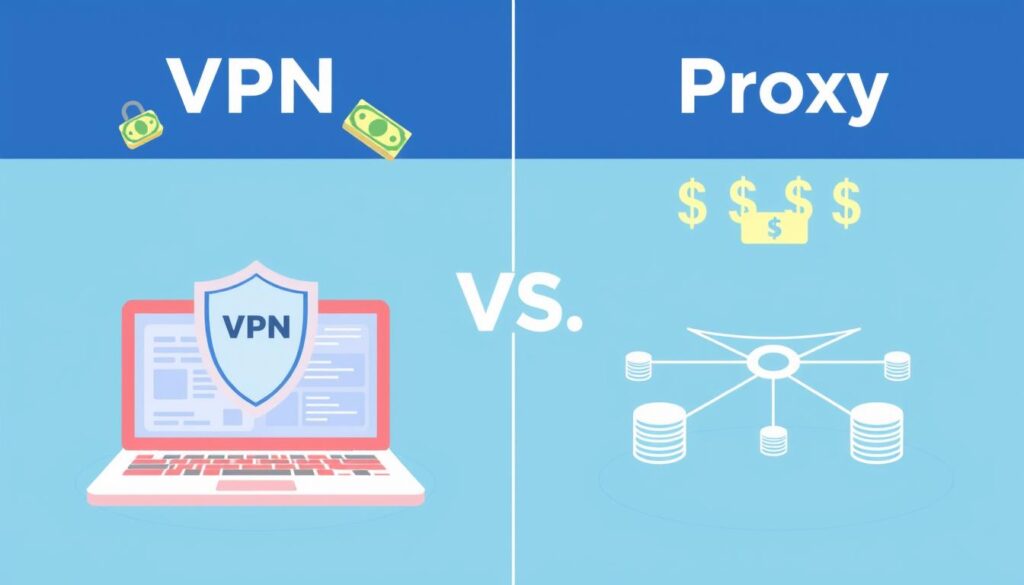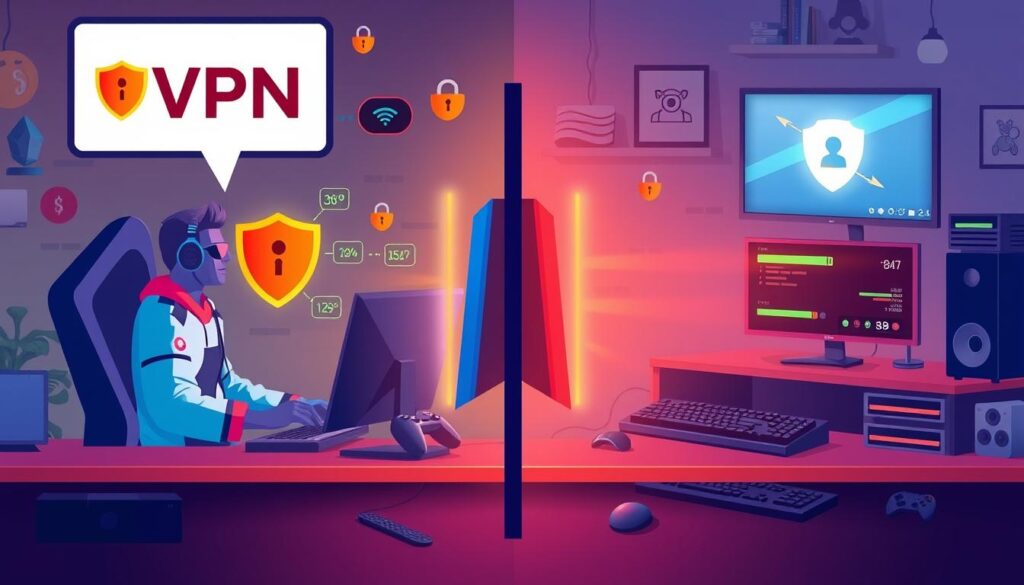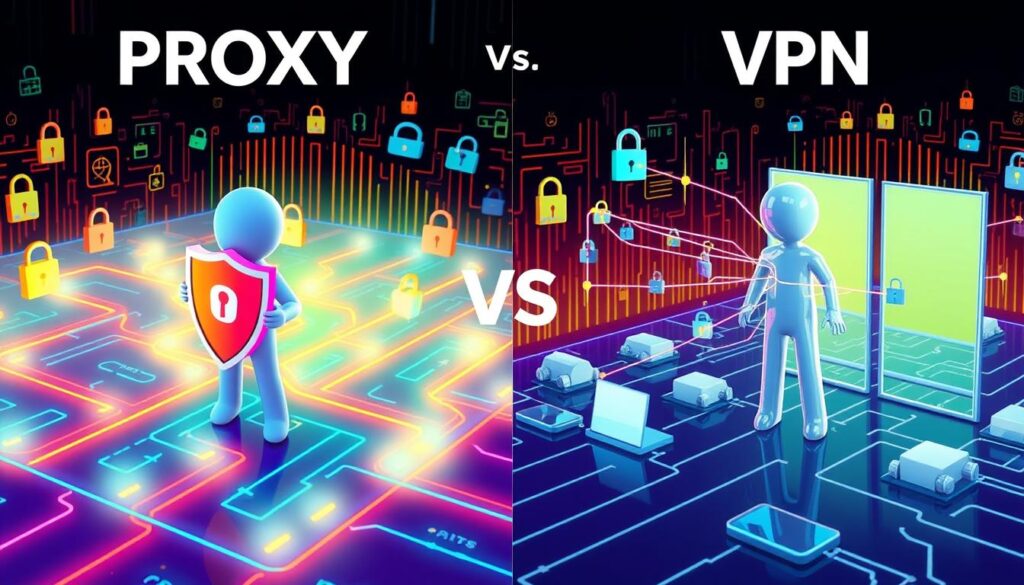As I explore online privacy and security, I often ask: is proxy and vpn the same? The answer is no. It’s important to know the differences between these two technologies for our online safety. Both are used for privacy and security, but they work differently and serve various purposes.
Looking at the proxy vs vpn comparison is key. This comparison highlights the strengths and weaknesses of each. It helps us decide which one is best for us. So, what do we learn from this comparison? Let’s find out:
Key Takeaways
- VPNs encrypt all web activity, while proxies only mask the IP address for specific applications or websites.
- VPNs provide a secure and stable connection, while proxy connections are often unstable.
- VPNs are capable of encrypting all traffic, making them more secure for sensitive transactions.
- Proxies are commonly free or low-cost, while VPNs are generally associated with a higher cost due to subscription models.
- VPNs ensure high amounts of security and privacy, while proxies offer limited security and privacy features.
- Both VPN and proxy technologies can be used across a variety of devices and operating systems.
Now, let’s dive deeper into proxies and VPNs. We’ll explore their differences in more detail. Whether you’re comparing proxy and vpn or just want to know the differences, this article has you covered.
Understanding the Basics of Proxies and VPNs
Online security and anonymity are key, and proxies and VPNs are often talked about. They’re not the same, with different uses and benefits. To choose wisely, knowing how each works is crucial. VPNs are usually faster and more reliable than proxies.
For streaming, a proxy or vpn for streaming can help get past geo-blocks. But they handle security differently. A proxy hides your IP to bypass restrictions. A VPN, though, encrypts all your internet data, offering better proxy vs vpn security.
Proxies have a server, your device, and the internet. VPNs have a client, a server, and an encrypted tunnel. Knowing these differences helps pick the best tool for your online needs.
Here’s a quick look at how proxies and VPNs compare:
| Feature | Proxy | VPN |
|---|---|---|
| Security | No encryption | Encrypted tunnel |
| Speed | Generally slower | Faster and more reliable |
| Usage | Typically used for specific applications or browsers | Covers all web activity |
Is Proxy and VPN the Same? A Clear Explanation
Understanding the proxy vs vpn difference is key. A proxy server works for specific apps or browsers. A VPN, on the other hand, protects all your internet traffic. This shows why each has its own benefits and drawbacks.
When deciding between proxy and vpn comparison, think about your security needs. Proxies hide your IP but don’t offer strong encryption like VPNs. VPNs, though, encrypt everything, keeping your personal info safe.
Choosing between proxy or vpn depends on your needs. For full online protection, a VPN is better. But for just bypassing geo-restrictions, a proxy might do. Knowing the differences helps you decide.
Here are some main differences:
- Proxies work for one app or browser, while VPNs cover all your internet.
- VPNs encrypt your data, protecting you from tracking and hackers.
- Proxies might be faster for single-site browsing, but VPNs are usually just a bit slower.
In summary, proxies and VPNs are not the same. By understanding proxy and vpn differences, you can choose the right one for you.
| Technology | Security | Privacy | Speed |
|---|---|---|---|
| Proxy | Low | Medium | Fast |
| VPN | High | High | Medium |
Security Features Compared
Online security is crucial, and both proxies and VPNs have their own strengths. To find out which is better for you, let’s look at their security features. I focus on proxy vs vpn for security when making my choice.
Encryption is a key factor. VPNs encrypt all data, while most proxies don’t. This makes VPNs safer for sensitive activities like online banking. In the battle of proxy vs vpn encryption, VPNs win hands down.
Here are some key security features to compare:
- Encryption methods: VPNs use advanced encryption to protect data, while proxies offer little to no encryption.
- Data protection capabilities: VPNs protect all web activity, while proxies only handle browser traffic.
- Authentication processes: VPNs have secure ways to verify identities, while proxies are less secure.
When it comes to proxy or vpn for security, VPNs are the better choice. They offer strong security features like encryption and data protection. While proxies might be enough for some, they can’t match VPNs’ advanced security. For top-notch online security, choose a VPN.
In the debate of proxy vs vpn for privacy, VPNs are also the better option. They don’t log or sell user data, unlike many proxies. This makes VPNs a more private and secure choice for online activities.
| Feature | VPN | Proxy |
|---|---|---|
| Encryption | Advanced encryption methods | No encryption or limited encryption |
| Data Protection | Protects all web activity | Only handles browser traffic |
| Authentication | Secure authentication processes | Limited or no authentication |
Speed and Performance Analysis
When comparing proxy vs vpn speed, proxies are often faster because they don’t encrypt data. But, the quality of the VPN service can make a big difference. For example, some VPNs are made for proxy or vpn for streaming and offer a smooth viewing experience. On the other hand, proxy vs vpn for gaming needs careful consideration because speed and performance are crucial for a good gaming experience.
The server location is a key factor in proxy vs vpn performance. Proxies can be set to use a specific server, which can boost speed and performance. VPNs, on the other hand, have a more complex routing process, which can slow things down. Fortinet notes that VPNs offer a secure, encrypted connection over public networks, but this can slow things down.
Some main differences between proxies and VPNs are:
- Proxies work at the application layer, while VPNs work at the network layer
- Proxies are generally faster than VPNs because they don’t encrypt data
- VPNs offer full user privacy protection, while proxy servers only protect IP addresses
In summary, choosing between a proxy and a VPN depends on what you need. If you want fast speeds and basic security, a proxy might be better. But, if you need full privacy protection and don’t mind slower speeds, a VPN is the way to go.
Privacy Protection Capabilities
When looking at proxy vs vpn for privacy, I focus on the protection each offers. I explore online security and find that proxy or vpn for anonymity is key. I’ll compare how proxies and VPNs protect my data, including logging, IP masking, and traffic routing.
Considering proxy vs vpn for browsing is vital for my online safety. Proxies reroute traffic but don’t always offer the same protection as VPNs. VPNs encrypt data, making it hard for hackers to intercept. This is crucial for keeping my online activities private and secure.
Using a VPN has many benefits for privacy, including:
- Encryption to stop interception and eavesdropping
- IP masking to hide my location and identity
- Traffic routing to prevent ISPs from watching my online activities
In summary, VPNs offer stronger privacy protection than proxies. With a VPN, I can keep my online activities private and secure. This gives me peace of mind while browsing the internet.
Cost Considerations and Value Comparison

Choosing between a proxy and a VPN involves looking at cost. Proxies are often free, while VPNs require a payment. Yet, the proxy vs vpn cost difference is just one part of the equation. The value each service offers is also key in making a choice.
For proxy or vpn for streaming, proxies might seem cheaper. But, if you want a safer and more private internet, VPNs might be the better choice. For proxy vs vpn for gaming, VPNs often have an edge in speed and performance.
Let’s compare the main features and costs of proxies and VPNs:
- Proxies: free, but may not provide the same level of security and privacy as VPNs
- VPNs: paid, but offer more secure and private internet access, with features like web encryption and IP address masking
The proxy vs vpn value depends on your needs and what you value most. If you just need something simple for casual browsing, a proxy might do. But, if security and privacy are top priorities, a VPN is a better choice.
In conclusion, proxies and VPNs have different costs and values. While proxies might be cheaper, VPNs provide more security and privacy. This makes VPNs a good investment for those who care about their online safety and privacy.
| Feature | Proxies | VPNs |
|---|---|---|
| Cost | Free | Paid |
| Security | Low | High |
| Privacy | Low | High |
Streaming and Entertainment Uses
Choosing between a proxy or VPN for streaming is key. Both have their good points and bad points. The debate on proxy vs vpn for entertainment is ongoing. A proxy or vpn for streaming platforms can help get past geo-restrictions. But, how well it works depends on the service used.
For proxy vs vpn for geo-restriction, VPNs are usually better. They offer strong encryption and hide IP addresses. This makes it easier to watch restricted content. Proxies, on the other hand, might not encrypt as well. This leaves users’ data open to being intercepted.
Here are some main differences between proxies and VPNs for streaming and entertainment:
- Encryption: VPNs offer full encryption, while many proxies don’t.
- Speed: Proxies might be quicker because they don’t encrypt, but the difference is small.
- Compatibility: VPNs work better with streaming sites like Netflix and Hulu.
In the end, picking between a proxy or vpn for streaming depends on what you need. But, if you want security and privacy, a VPN is usually the better choice.
Gaming and Online Activities

Choosing between proxy vs vpn for gaming depends on your needs. For online security, a proxy or vpn for online security is key. In gaming, where speed matters, proxy vs vpn for gaming performance is crucial.
About 70% of gamers use a proxy or vpn for online activities to access blocked content. But, picking between proxy vs vpn for gaming is tricky. Proxies are faster but less secure, not good for sensitive data.
VPNs, on the other hand, offer security and privacy, making them great for proxy or vpn for online security. But, they can slow down your game due to encryption. So, it’s a trade-off between speed and security.
Dedicated proxies are popular among gamers for their security and speed. But, free proxies can risk your data. So, your choice between proxy or vpn for online activities depends on what you value more.
| Option | Security | Speed |
|---|---|---|
| Proxy | Lower | Faster |
| VPN | Higher | Slower |
In summary, the choice between proxy vs vpn for gaming and online activities depends on your needs. Proxies are faster, but VPNs are more secure, making them better for proxy or vpn for online security.
Business Applications and Use Cases
Choosing between a proxy and a VPN depends on your business needs. For corporate security, a VPN is better. It offers a secure and private connection for remote work. This is crucial for businesses with sensitive data, as it guards against cyber threats and ensures data protection.
A proxy might not offer the same security. Yet, it’s useful for tasks like content filtering and load balancing. Still, for proxy vs vpn for business, a VPN is usually the top choice. It provides a secure and private connection across the network.
Using a VPN for business has many benefits:
- Secure and private connections for remote work
- Protection against cyber threats and data leaks
- Ability to mask IP addresses and encrypt data
The choice between a proxy or vpn for corporate security depends on your business’s needs. But for high security and privacy, a VPN is often the best. With more remote work, picking the right solution is key.
By picking a VPN, businesses keep their data safe. Remote workers can access what they need securely. This is vital for companies with sensitive data, adding an extra security layer and proxy or vpn for data protection.
When to Choose a Proxy Over a VPN

When deciding between proxy vs vpn, think about what you need. If speed is key, or you’re accessing certain websites, a proxy might be better. Proxies are faster than VPNs because they act as a gateway. But, they offer less security and privacy.
Here are some times when you might choose a proxy or vpn:
- When you need to access geo-restricted content, and speed is essential.
- When you’re using applications that don’t support VPNs.
- When you want to hide your IP address, but don’t need the extra security features of a VPN.
In these cases, when to use proxy is more relevant than when to use vpn. Proxies mask your IP and route traffic without encryption. This makes them ideal for certain tasks. But, remember, proxies don’t offer the same security as VPNs. Always consider the risks and benefits before choosing.
The choice between a proxy and a VPN depends on your needs. Understanding the differences between proxy vs vpn helps you decide. This way, you can pick the best tool for your specific situation.
| Proxy | VPN |
|---|---|
| Faster speeds | Enhanced security and privacy |
| Less secure | More reliable connections |
| Better for geo-restricted content | Better for sensitive data transfer |
Common Misconceptions and Myths
There are many proxy vs vpn myths out there. Some think proxies and VPNs are the same or only for illegal stuff. But they’re not. Proxies and VPNs are different, each with its own job. Proxies hide specific requests, while VPNs encrypt all your device’s traffic.
Some people think VPNs are slow or hard to use. But today’s VPNs are easy to use and can even speed up your browsing. Also, common myths about proxy and vpn say proxies are only for bad stuff. But they’re also used for good things like filtering websites and saving bandwidth.
Here are some key facts to consider:
- VPNs encrypt your internet traffic, making it hard for others to see your data
- Proxies don’t encrypt, so your connection isn’t as safe
- VPNs work at the operating system level, covering all your device’s traffic
- Proxies work at the app level, only affecting apps you’ve set them up for
It’s also key to know not all VPNs are the same. Some free VPNs don’t protect your data well and might sell your info to advertisers. This goes against the main reason for using a VPN.
In short, it’s crucial to know the truth about proxy vs vpn myths and common myths about proxy and vpn. By understanding their differences and uses, you can choose the best way to keep your online world safe and private.
| Technology | Encryption | Level of Security |
|---|---|---|
| VPN | Yes | High |
| Proxy | No | Low |
Conclusion: Making the Right Choice for Your Needs
Exploring proxies and VPNs shows that your choice depends on your needs. Proxies are simpler and cheaper for basic tasks like getting past geo-blocks. But VPNs give better security and privacy, which is key for sensitive online actions.
If security and privacy matter most, choose a VPN. It encrypts everything and keeps your online actions secret. But, if you value speed and simplicity, a proxy might be better. It’s great for gaming or streaming.
Think about what you really need – like protecting data, accessing blocked content, or just staying anonymous online. By looking at the proxy vs. VPN differences and what you need, you can pick the right choice. This will improve your online life and meet your security and privacy goals.
FAQ
What is the difference between a proxy and a VPN?
How do proxy servers work?
What are the key components of a VPN?
Are proxies and VPNs the same thing?
How do the security features of proxies and VPNs compare?
Which is faster, a proxy or a VPN?
How do proxies and VPNs compare in terms of privacy protection?
Are proxies or VPNs better for streaming and entertainment?
Which is better for gaming and online activities, a proxy or a VPN?
How do proxies and VPNs compare for business use cases?
When should I choose a proxy over a VPN?
What are some common myths and misconceptions about proxies and VPNs?
Source Links
- https://www.geeksforgeeks.org/difference-between-virtual-private-network-vpn-and-proxy/
- https://usa.kaspersky.com/resource-center/preemptive-safety/vpn-vs-proxy-server?srsltid=AfmBOor2acNmhetFaCTBuGMm7LPY6lFQYsZZDTP5U9sdGznhq1PBX2uY
- https://usa.kaspersky.com/resource-center/preemptive-safety/vpn-vs-proxy-server?srsltid=AfmBOopQh7PtE1FRVDerSiAoc5WvZcAMNqXwg-eN-iwPPw9zrBy0kjDW
- https://www.security.org/vpn/proxy-vs-vpn/
- https://nordvpn.com/blog/vpn-vs-proxy/
- https://us.norton.com/blog/privacy/proxy-vs-vpn
- https://usa.kaspersky.com/resource-center/preemptive-safety/vpn-vs-proxy-server?srsltid=AfmBOopKUdVE6_hkSiAnEs8A06CFtS86qVM6iGAyiUDyFcxj1opFgQ1-
- https://surfshark.com/blog/vpn-vs-proxy
- https://brightdata.com/blog/proxy-101/vpn-vs-proxy
- https://www.upguard.com/blog/proxy-servers-vs-vpns
- https://www.bitdefender.com/en-us/blog/hotforsecurity/vpn-vs-proxy-understanding-different-privacy-protection-tools
- https://avpsuite.com/blogs/proxy-or-vpn-which-one-offers-better-privacy-and-security/
- https://www.avast.com/c-vpn-proxy-tor-which-is-best
- https://medium.com/@th3Powell/vpn-vs-proxy-which-one-ensures-better-online-security-acd1e0482b75
- https://www.cnet.com/tech/services-and-software/proxy-vs-vpn/
- https://rayobyte.com/blog/difference-game-proxy-vs-gaming-vpn-online-botting/
- https://rayobyte.com/blog/proxies-vs-vpn-whats-difference/
- https://www.ipvanish.com/blog/vpn-vs-proxy/
- https://www.hostwinds.com/blog/vpn-vs-proxy
- https://version-2.com/zh/2023/01/vpn-vs-proxy-which-should-your-business-choose/
- https://www.fortinet.com/resources/cyberglossary/proxy-vs-vpn
- https://www.ipvanish.com/blog/what-is-a-vpn-proxy/
- https://www.drivelock.com/en/blog/facts-and-myths-proxy-serversproxy-servers
- https://www.privacyjournal.net/vpn-myths/
- https://www.linkedin.com/pulse/vpn-vs-proxy-differences-pros-cons-when-choose-27ljf
- https://www.jobsity.com/blog/proxy-or-vpn-which-should-you-choose-and-why
- https://www.hdfcergo.com/blogs/cyber-insurance/guide-to-choosing-between-vpn-and-proxy-server



